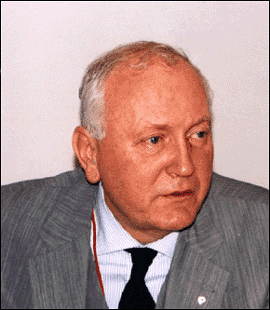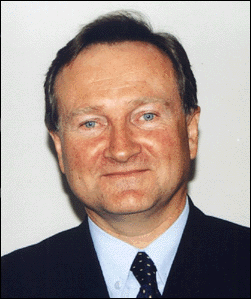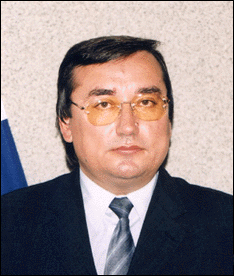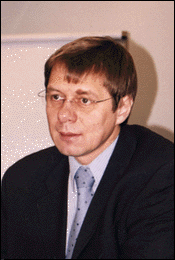 TELECOMMUNICATIONS TELECOMMUNICATIONS |
 On the right track On the right track |

It is no surprise that the largest foreign direct investment that entered Slovakia was directed at the telecommunications sector, when German Deutsche Telekom bought a majority stake in the Slovak fixed lines operator Slovenske Telekomunikacie. In the near future, Slovakia should become a country possessing highly developed information and communication technologies. "Slovakia has an extremely good position in Central Europe and in Europe as a whole, both for manufacturers and distributors," says Mr. Peter Weber, General Manager of Compaq Slovakia.
 Mobile communication Mobile communication |
In 2001, mobile communication surpassed fixed line telephony in Slovakia, and the country joined the ranks of regional markets where advanced mobile communication substituted fixed line telephony.

The success of mobile services in this market is a result of continued tariff reductions, which, along with sustained income growth, served to make mobile services more affordable than re-balanced fixed-line services. "The Slovak mobile market is a special phenomenon. The penetration of mobile operators will grow constantly for another couple of years", thinks Mr. Ladislav Mikus, CEO of Slovenske Telekomunikacie.
The mobile communication market is very attractive in Slovakia. According to mobile analysts Slovakia has the lowest prices per minute of mobile communication in the world. Currently, Slovakia has two mobile operators - EuroTel and Orange (formerly known as Globtel). Competition between these two operators is very fierce which pushes mobile prices down; that is the main reason why almost 50% of all Slovaks can afford to keep a mobile phone.
If a third GSM license is granted, this should further increase the number of mobile phone users.
The government is scheduled to announce a tender for a third generation UMTS and GSM license in the first half of 2002. The earliest term the third operator could begin operations is on July 1, 2002, when Orange and EuroTel's exclusivity rights for use of the GSM 1800 expire.
However, despite the profit expected from the sale of these licenses by Slovak government, experts say that the country's small market size may give foreign telecom firms a reason to avoid the upcoming GSM and UMTS bids. The small market size has forced the government to offer a combined package of GSM and UMTS licenses rather than individual licenses. Two licenses out of three will be granted to present operators. A new third operator could boost the market, though Orange and EuroTel are gaining new customers and increasing their market shares at such pace that the attractiveness of the market for a potential third investor gradually diminishes.
 Fixed lines Fixed lines |
Slovenske Telekomunikacie is the major provider of telecommunications services in the Slovak Republic. ST owns and operates a nation-wide telecommunications network, and provides local, national and international telephone, leased line, data network and telex and telegraph services, distribution and broadcasting of radio and television signals among other telecommunication services.
 | Slovak Telecom was a state-owned monopoly in the past and still has a monopoly on basic voice telephony services that would expire in January 2003. According to the Cabinet's resolution of July 2000, the strategic investor Deutsche Telekom acquired a 51 % stake in ST for SKK 1 billion. "The acquisition of Slovenske Telekomunikacie was a very good strategy for Deutsche Telekom," thinks Mr. Mikus. " In the future, we expect to sell and additional 15 % stake of Slovak Telecom on the stock exchange," adds Mr. Jozef Macejko, Minister of Transport and Telecommunication of the Slovak Republic.
ST is to increase its fixed-line penetration in Slovakia from 32% in 2001 to 37% by 2005, mainly through the installation of ISDN lines, according to an analysis prepared by IDC, a company that focuses on telecommunication markets in Central Europe. Slovenske Telekomunikacie also owns an important 51 % majority stake in mobile operator EuroTel.
A new telecommunication company called Energotel was created as a possible competitor to Slovenske Telekomunikacie. The company specializes in data transfer services, a segment that is being fully liberalized and has the potential to become the most competitive market segment. The company is going to be created by merging the infrastructures owned by the energy sector companies. "There is nothing wrong about competition," Minister Macejko stresses.
 Implementing European standards Implementing European standards |
When comparing the Slovak Republic situation with the EU status, it is apparent that the originally stipulated principles of the Slovak telecommunication policy have converged to pan-European principles. However, executive and legislative spheres have remarkably limited the real level of their implementation. A new Act on Telecommunications, which became effective in 2000, created the framework for the telecommunications policy. The Telecommunications Office of the Slovak Republic was transformed into an independent national regulatory authority for the telecommunications field. Liberalization in the telecommunications services will be fully implemented from 1 January 2003 when the exclusive right to providing basic voice telephony services by Slovak Telecom will be terminated. The Telecommunications chapter of the Acquis Communautaire should be fully implemented by the end of 2004, so that the Slovak legislation framework will be compatible with the EU regulations.
 Towards an "Information society" Towards an "Information society" |
In the beginning of June 2001 the Government of the Slovak Republic passed a policy supporting the development of the information society.
According to analysts, there are five big leaders in the area of IT services in Slovakia. Some well-known suppliers such as COMPAQ or IBM are among the strongest players. "This is a very small market and everybody is trying to offer not only products but also services"characterizes the IT market Mr. Marian Mikulcik, General Manager of CSC Slovakia.

The IT environment also reflects social changes and, in order to compete with European standanrds, many Slovak institutions change their solutions from local to multinational companies.
According to the latest report from International Data Corporation - IDC - 250.000 people access the Internet at least once a month in Slovakia. In other words, the Internet is currently used by approximately 18% of the adult population. While Internet usage at the workplace is comparable with other Central European countries (about 51 %), Slovak households and classrooms fell hugely behind the average (23 %). 8 % of the Slovak population already use WAP connections through their mobile phones. The total number of Internet users in Slovakia should triple by the end of 2005.
In the area of e-business Slovakia is about two years behind the neighboring Czech Republic. Both corporate and private e-business volumes are very moderate. However, on-line purchases should become an important factor on the market in a few years time. At the moment, less than 3 % of the Slovaks buy goods on-line, and less than 2 % make their financial transactions through the Internet. |

